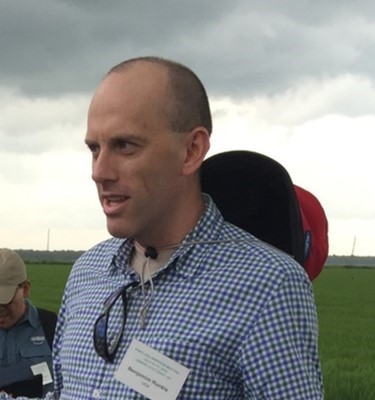Benjamin Runkle will present 'Sustainability in Rice Production Practices' at 3 p.m. Monday, Sept. 24, at the Food Science Department, Room D-2. The Food Science Department is located 2 miles north of the main campus at 2650 N. Young Ave.
Runkle is an assistant professor of biological and agricultural engineering at the University of Arkansas. He started this position in 2014 following post-doctoral work at the Institute of Soil Science at the University of Hamburg in Germany. He has three degrees in Civil and Environmental Engineering: a B.S.E. from Princeton University and an M.S. and Ph.D. from the University of California, Berkeley.
He was recently awarded an NSF Faculty Early Career Development program grant from the National Science Foundation's Directorate for Engineering. He researches the terrestrial carbon and water cycles in natural and managed landscapes, and has recently focused on rice production systems in Arkansas. This field-based research involves long-term measurements of key environmental fluxes (e.g., evapotranspiration, surface water flows, and carbon dioxide and methane emissions from the landscape to the atmosphere). This research provides the basis for process studies and computer modeling approaches to environmental systems.
In this talk, Runkle will present work from field studies in Arkansas, where he works with farmers to test the effects of water-saving irrigation practices on the climate impact of rice production. The 'swampy', anoxic conditions created when rice is typically flooded help prevent weed and disease problems and keep the water-loving species well hydrated. However, these conditions are also conducive to microbial production of methane (CH4), a greenhouse gas with 34 times the global warming potential of CO2. Fortunately, a water-saving irrigation practice called alternate wetting and drying (AWD), can also reduce CH4 emissions through the deliberate, periodic introduction of aerobic conditions of 3-10 days each. By conducting near continuous measurements on a pair of adjacent, production-sized fields under more conventional and AWD irrigation treatments, Runkle and colleagues demonstrate a 40 percent reduction in CH4 emissions without harming harvest yield. These findings and others will be contextualized in a discussion about sustainability aspects of rice production in the U.S. Mid-South.
Topics
Contacts
Connie Tharel, administrative specialist II
Food Science
479-575-4605,
